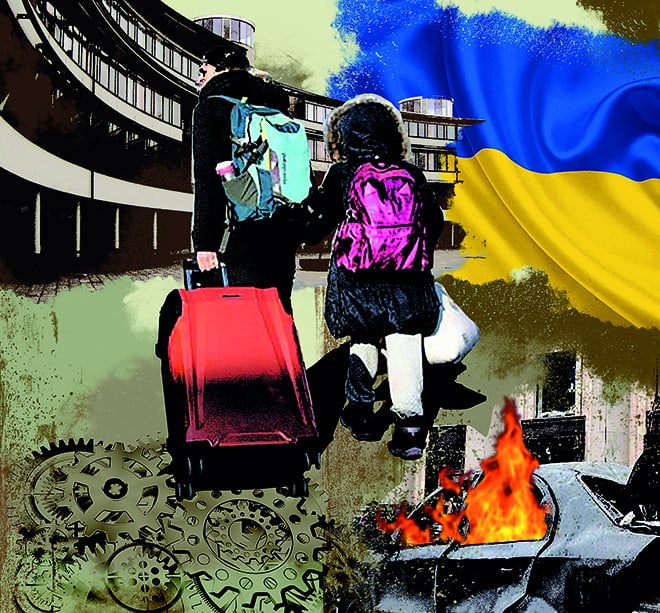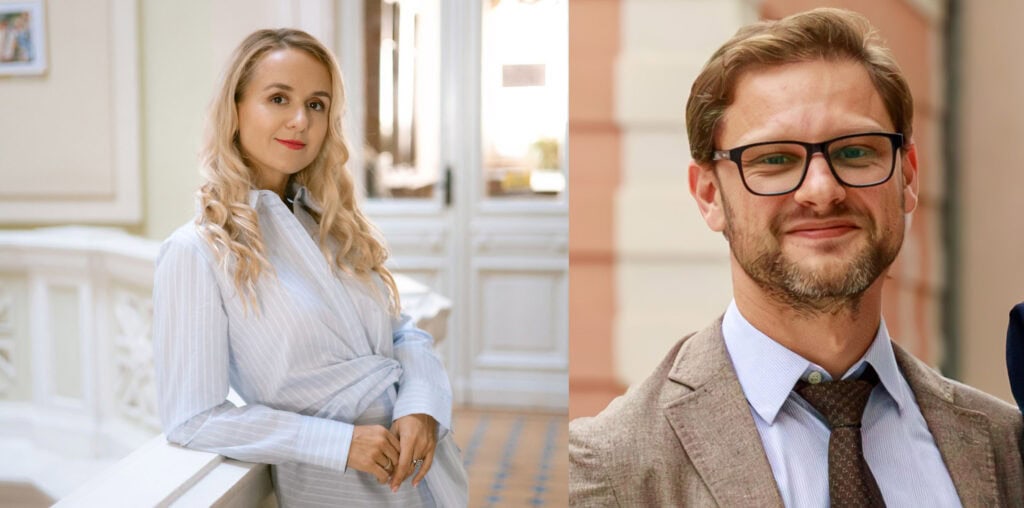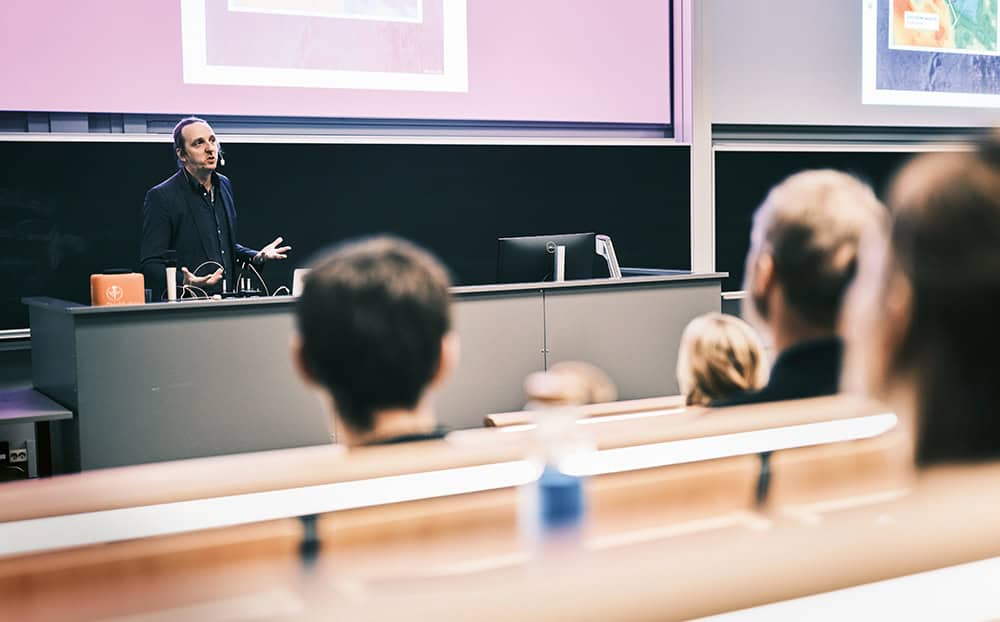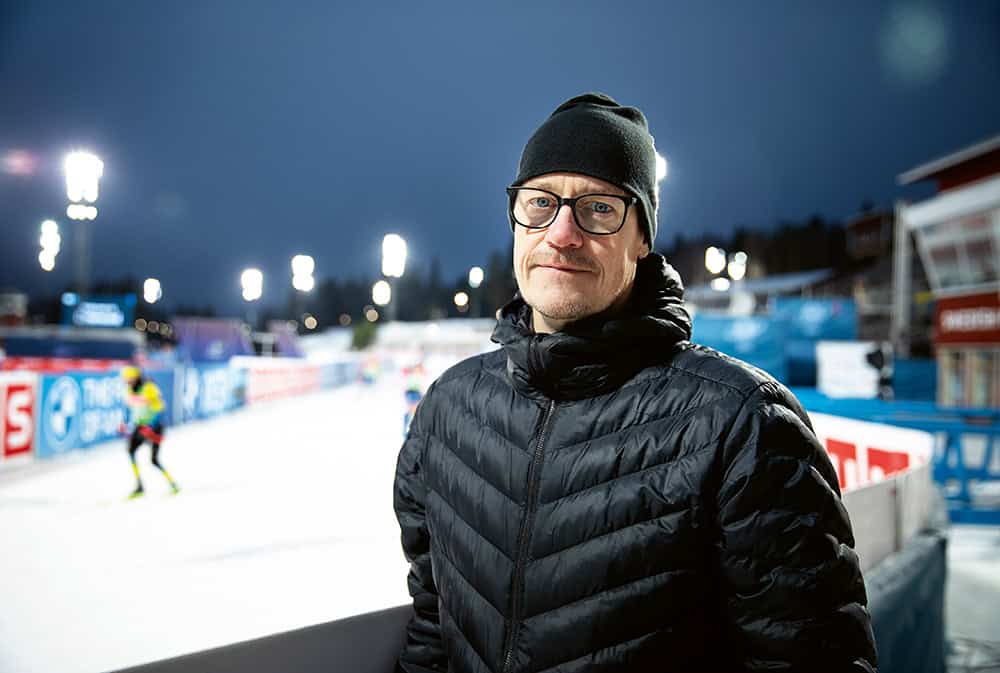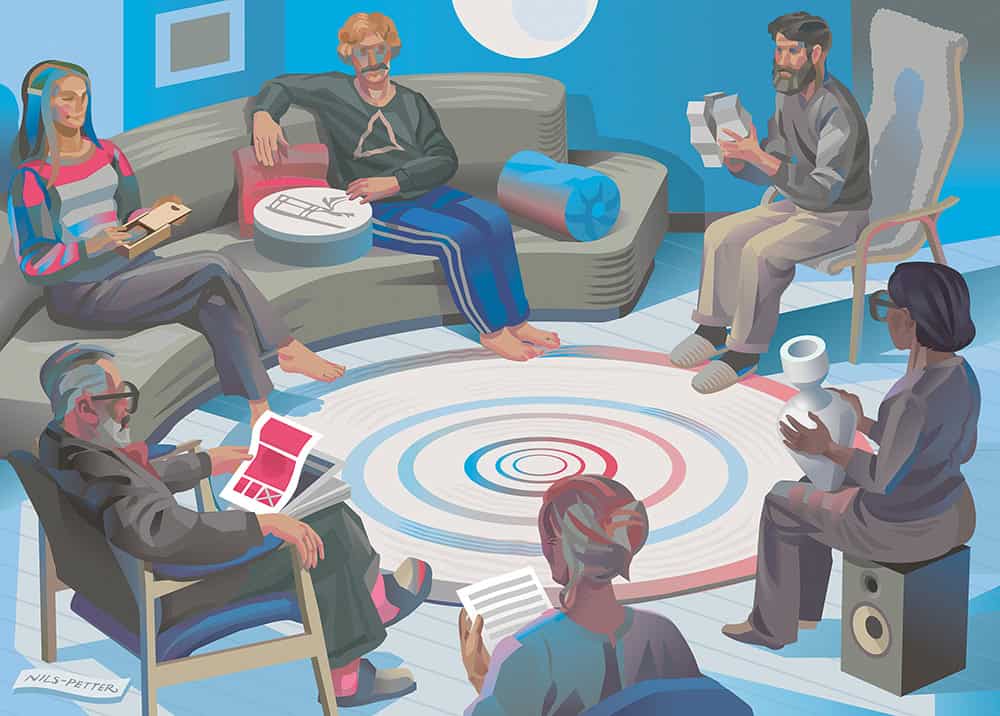Olena Shevtsova becomes noticeably upset when she talks about how the war broke out in her homeland. She talks about her parents, who do not want to leave Ukraine and with whom she talks every day.
Quietly – and a little reluctantly – she describes her escape route from Ukraine. She came to Sweden via Ireland, where a friend and colleague took her in. Just a couple of days earlier, she and her six-year-old daughter had woken up to the sound of Russian airstrikes in their home city of Kyiv. She decided that they needed to leave Ukraine as soon as possible.
Possibility to continue research
Olena is a researcher in public administration and receives us in her office at Södertörn University, which she shares with a colleague. She had actually participated in a project at Södertörn before the war, as an expert from the Ukrainian School of Governance in Kyiv. After a short time in Ireland, she enquired about the possibility to come to Sweden to continue her research.
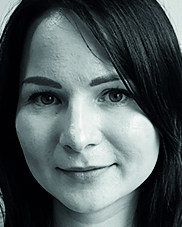
Södertörn had already launched a project to help researchers fleeing the war. Previously, the Foundation for Baltic and East European Studies had funded a position intended for at-risk researchers from the Baltic Region. When the war began, this was expanded to six places. Olena applied and was offered one of the positions. The contract runs for one year at a time.
Because this is absolutely a temporary solution, she says firmly. She is deeply grateful for all the help and support she has received from the university and colleagues. “But as soon as it is possible, I want to return home to my country, my life and my family in Ukraine. And to my job!”
Her daughter attends a Ukrainian school via video link in the mornings, while Olena works from the apartment she rents close to Södertörn. In the afternoons, she has managed to get her daughter into a Swedish school, where she also goes to the after-school club for a while every day. As her daughter speaks fluent English, there are no major problems at school, Olena explains proudly.
A temporary solution
But she has not yet considered a scenario where her daughter only goes to a Swedish school. This is temporary, and we will return to Ukraine, says Olena again.
Last summer, when Olena Shevtsova started her job at Södertörn and it was the summer holiday, mother and daughter spent working days at the office. Being able to go to school and socialise with other children is important, Olena says.
She is one of five researchers and doctoral candidates who are currently at Södertörn University as part of the project for Ukrainian researchers fleeing the war. Soon, the sixth position will be filled, as another nomination is on its way in, says Andreas Åkerlund, the Faculty Council member responsible for internationalisation.
“Sanctuary is priority one, but the project is also forward-looking. For Ukraine, but also for Södertörn University. We are a university that profiles itself towards the Baltic Region and Eastern Europe.”
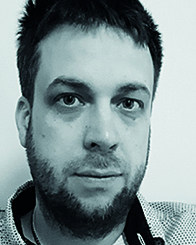
People are nominated for the programme by the research constellations at Södertörn.
“I have to say no to quite a few enquiries for the simple reason that we don’t offer certain subjects,” says Åkerlund. “We can only accept researchers who can be integrated into our existing research environments, and we are very much a humanities and social sciences university. We don’t have medicine and we have very little science and technology.”
Makes research environments stronger
The project also benefits Södertörn University, says Åkerlund, because it brings in active researchers, both well-reputed and young researchers at the beginning of their careers. That makes existing research environments stronger. Hopefully, people will also establish good contacts with corresponding environments in Ukraine, which will certainly benefit the research they are conducting in the longer term, he says.
At the same time, he emphasises that – after only six months – it is too early to say what the long-term and more precise results will be of Ukrainian researchers fleeing the war being able to work at Swedish universities.
Raili Uibo, coordinator of the project, says that the researchers who are already here are thinking about how to proceed with their various projects and research studies. And how contacts with Södertörn’s research environments can be maintained when the war is over.
It is also a question of the reconstruction of Ukraine, she points out. “This is a flexible project, and the researchers can continue to teach remotely at Ukrainian universities, which some of them also do. They conduct their research at Södertörn, which benefits us, but they’re also able to make a contribution in their home country,” she says.
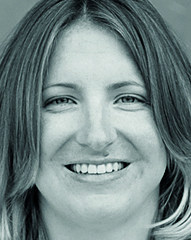
Key people for reconstruction
SUHF, the Association of Swedish Higher Education Institutions, revived a previously dormant working group for refugee issues shortly after the outbreak of the war in Ukraine. One of the members of the group is Karolina Catoni, international administrator at the Gothenburg University and national coordinator for Scholars at Risk.
She also emphasises sanctuary for Ukrainian researchers as the most important issue to focus on at right now.
“Higher education institutions’ capacity to welcome at-risk researchers is only a short-term solution,” says Catoni. Ultimately, it’s about offering protection. At the same time, researchers are key people in the long term. When the war is over, many of these researchers will in all likelihood play important roles in the reconstruction of Ukraine.”
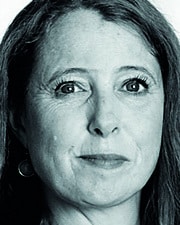
Catoni also highlights the need to create distance placements for researchers who are still in Ukraine. We can include them with the aid of digital resources, for example, which is not something that happens in Sweden on a larger scale yet, she says.
SUHF’s working group will coordinate the various efforts of Swedish higher education institutions and identify what they need in order to be able to handle the refugee situation as efficiently as possible, says the group’s chair, Cecilia Christersson, who is also the Deputy Vice-chancellor of Malmö University.
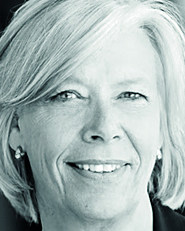
The group was set up in February 2016, when the civil war in Syria broke out.
“Although we’ve learned a lot from previous refugee situations, there are many differences. The EU’s quick response, with its decision on the Temporary Protection Directive, eases the situation for refugees from Ukraine,” says Christersson.
“So far, we’ve not seen a large influx of people from Ukraine to Sweden. But Sweden’s preparedness to receive fleeing researchers is greater now,” she adds.
Sweden the first option
A drizzle is falling on Södertörn University when Iryna Pinich, a docent in English at the University of Kyiv, meets us outside the entrance to one of the buildings. She arrived in Sweden less than a week after Russia attacked Ukraine.
Her sister has been living here for a couple of years, so Sweden was the first option that came to mind when she decided to flee the country.
Once here, she began to look for research positions at other universities, including Uppsala University and Stockholm University. When an advertisement for the programme at Södertörn University popped up in her browser, she sent an email and received a reply almost immediately.
“Pure coincidence,” she says. “In fact, it feels as if my whole life since the outbreak of the war is a series of small coincidences. Everything feels a bit temporary and by chance.”
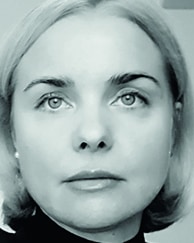
Now she has settled in at Södertörn, and she has a contract for a maximum of two years. “I really want to emphasise my enormous gratitude towards the people in the programme and my new colleagues at the department. I could never have dreamed of being in such a positive academic environment, despite the difficult situation.”
Iryna Pinich describes her current job as ”between” what she did in Kyiv and something new. As a visiting researcher at Södertörn, she presents her research, publicises it and attends seminars to familiarise herself with academia in Sweden. She is also involved in the work of the University of Kyiv, and teaches there remotely.
Researching love
Her research is – fittingly enough in view of the war, she says – about the concept of love. Romantic love, love of a god or love of parents.
“Research tends to deal with these as different types of love, but I want to try to get a handle on what love really is. It was also fitting that my previous research was about anger, but I probably felt somewhere inside that more love is needed in modern society. So I changed direction,” she says with a restrained smile.
She definitely wants to return home to Ukraine when the war is over. “The sooner the better. I’m very grateful to be here. To be able to develop, learn about Swedish academia and benefit from contacts and acquire knowledge in order to be able to implement it when I return home to Ukraine.”
When the war broke out, all activity at the University of Kyiv was initially put on hold, she explains. When she gave her first lecture from Sweden after things started up again, there was a lot of emotion in the room.
“Even though it was an online room with students, you could still really feel how much we needed to be there with each other. I felt that I was needed there, that my words were needed. Everything’s going to be fine.”
Since the Russian troops withdrew from the Kiev area, Iryna has thought about returning, but for now she wants to wait and fulfil her commitments in Sweden. “It’s so difficult, to put it mildly, to talk to family and friends in Kyiv, and I miss them. But when the war broke out, I had a very strong feeling that I had to take my daughter away from there, and I still feel the same way.”
Her daughter turned 18 this summer, and is studying chemistry online at the University of Kyiv. She had already begun her studies when the war broke out. They live together in a sub-let apartment outside Stockholm.
Can broaden academia
Paradoxically enough for Ukraine, says Iryna Pinich, the war will probably have a positive effect on research in the long run. So many Ukrainian researchers spending time and working abroad builds experience and provides opportunities to build new networks. This will have an impact on research and broaden academia in the future.
“Hopefully! That’s my guess. I think I’ve already experienced it in the short time I’ve been here.”
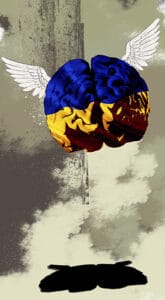
A more negative effect of course is the risk of brain drain in Ukraine. But that doesn’t necessarily have to be as negative as it sounds, she believes. Even if some of the Ukrainian scientists now in exile find an environment or a research position that means they want to remain abroad when the war is over, they will probably contribute to the reconstruction of their homeland in various ways anyway.
“There is always a risk of brain drain when it comes to international projects,” says Andreas Åkerlund. “In the case of Ukraine, however, the alternative is worse, because this research would otherwise not be conducted at all.”
The project at Södertörn University is not actually limited to Ukrainian researchers, but can potentially offer places to at-risk Russian or Belarusian researchers, for example. But since these do not fall under the Temporary Protection Directive, the university has not received any Russian researchers yet.
Åkerlund, argues that the previous government’s instruction not to cooperate with Russian state institutions does not necessarily cover individual Russian researchers. Södertörn University cannot prevent people from collaborating with Russian researchers on an individual basis, but as a university it has no collaborations with state Russian institutions.
Risk of brain drain in Russia
While many of Ukraine’s researchers have fled abroad to work since the outbreak of the war, flights and train departures out of Russia also quickly became fully booked when the country’s President, Vladimir Putin, declared a state of mobilisation after seven months of war. So the risk of brain drain in Russia is becoming a growing possibility, say several of the researchers that Universitetsläraren has spoken to.
Joakim Ekman, professor of political science and director of the Centre for Baltic and East European Studies at Södertörn University, explains that Russia actually had an ongoing brain drain even before the outbreak of war. In recent years, the country has become more authoritarian, while freedom of the press and academic freedom have declined.
“Then came the war, and now they have also begun mobilisation. It’s difficult to know for sure of course, but when I ask around, it seems that many people just want to leave Russia,” says Ekman.
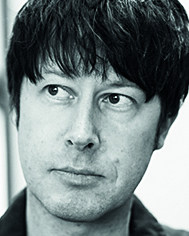
In the long term, the war in Ukraine will impact research negatively, he believes, both in Ukraine and Sweden. But above all, it has negative effects for research on Russia,. Especially if the war drags on.
Knowledge gaps in the long run
It’s not good when ties and networks are cut, as they have been now, Ekman continues. Fieldwork in Russia is out of the question, and it is difficult for certain research groups in which Russia was previously involved, for example polar researchers, to collect any data at all.
“There will be some knowledge gaps in the long run. Depending on what researchers do exactly, the war has already led to losses,” he says.
The chair of SUHF’s group for refugee issues, Cecilia Christersson, warns that the consequences of the Ukraine war for research could be very great. In the long run, it may impact academic freedom, and lost contacts with both Russian and Ukrainian researchers may have the long-term effects.
“A country’s entire innovation power and infrastructure has been damaged,” says Christersson. “Maintaining learning in society requires functioning universities and academia in the country, and we can already see the consequences of researchers having to stop what they were doing. And if you are forced to abandon your research, it can be difficult to pick it up again.”
Researching reforms
In an auditorium at Södertörn University, about ten people sit scattered across the rows of seats, and a slightly smaller audience is also following Olena Shevtsova’s research seminar via video link. The subject is reforms in Ukraine and the implementation of international agreements, such as the country’s association agreement with the EU.
At about the same time as she begins the seminar by sending warm greetings to her people and country, a push notification arrives on the Universitetsläraren reporter’s mobile phone with the news that Vladimir Putin is commencing mobilisation.
Olena Shevtsova presents a partnership model for stakeholders that she has developed, and discusses how the model can be used in transnational cooperation and in the implementation of reforms. She does so in a clear voice, while news agency reports saying Russia is expected to enlist 300,000 reservists to fight in Ukraine roll by.
Swedish academia helping Ukrainian researchers fleeing the war
Research funder The Knowledge Foundation has made SEK 50 million available for higher education institutions to offer places to Ukrainian researchers fleeing the war. So far, 16 applications have been granted and SEK 36 million paid out, including to Karlstad University, Örebro University, Mid Sweden University and Malmö University. The Foundation is funding employment for up to two years and covering 90 per cent of the cost. Yvonne Fors is programme manager at the Knowledge Foundation.
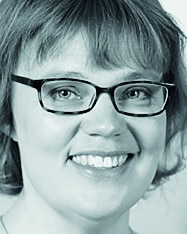
“What this will lead to in the longer term can be difficult to predict, but research and higher education are important and must continue regardless of whether there is war. If someone can be given sanctuary to be able to do research, and then also be able to return, we are all winners,” she says.
Swedish colleges and universities can also apply for funds from All European Academies, ALLEA, to cover places for Ukrainian researchers. The applications are divided into two rounds, the second of which has not yet begun.
The Swedish Institute, SI, has ended a call for proposals in which higher education institutions can apply for a maximum of SEK 1m to contribute to maintaining Ukrainian research networks for a period of up to 18 months. SI has also run a corresponding scheme where higher education institutions have been able to apply for grants for projects intended for academics within Ukraine.
Other support measures include:
• Individual Ukrainian researchers with doctoral degrees can apply for 20 scholarships for five-month placements at Uppsala University.
• KTH, Karlstad University and Mid Sweden University have invited Ukrainian researchers to contact them directly to explore opportunities for visiting researcher positions.
• The Swedish Foundation for Strategic Research, SSF, has set aside SEK 30 million that individual researchers with Ukrainian citizenship who came to Sweden in 2022 can apply for.
• The Royal Swedish Academy of Sciences, the Wennergren Foundations, Mistra and the Wallenberg Foundations have all funded calls for scholarships for visiting Ukrainian researchers.
